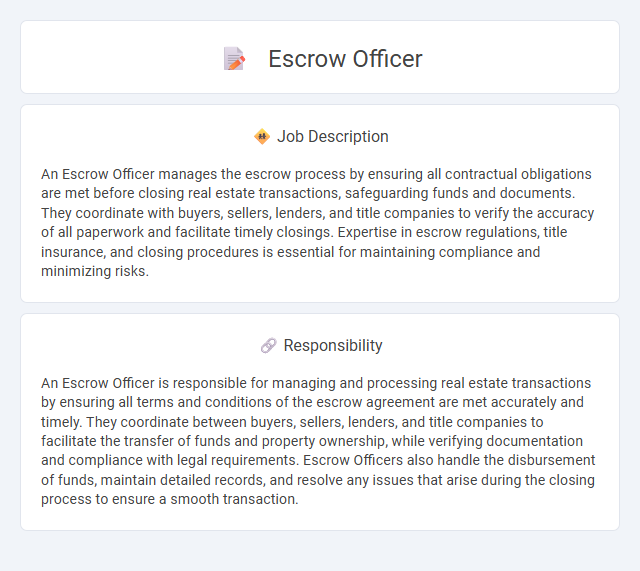
An Escrow Officer manages the escrow process by ensuring all contractual obligations are met before closing real estate transactions, safeguarding funds and documents. They coordinate with buyers, sellers, lenders, and title companies to verify the accuracy of all paperwork and facilitate timely closings. Expertise in escrow regulations, title insurance, and closing procedures is essential for maintaining compliance and minimizing risks.
Individuals who exhibit strong attention to detail and possess excellent organizational skills are likely to be well-suited for an Escrow Officer role, as the job requires managing complex financial transactions. Those who prefer a structured work environment and are comfortable handling legal documents and coordinating with multiple parties may find this position fulfilling. People who struggle with multitasking or have difficulty maintaining accuracy under pressure might face challenges in adapting to the demands of this job.
Qualification
An Escrow Officer must possess a strong understanding of real estate laws, title insurance, and closing processes, typically backed by a bachelor's degree in business, finance, or related fields. Certification from recognized organizations such as the American Escrow Association enhances credibility and expertise in managing escrow accounts and ensuring compliance with regulatory requirements. Excellent communication skills and attention to detail are essential for coordinating with buyers, sellers, lenders, and agents throughout the closing process.
Responsibility
An Escrow Officer is responsible for managing and processing real estate transactions by ensuring all terms and conditions of the escrow agreement are met accurately and timely. They coordinate between buyers, sellers, lenders, and title companies to facilitate the transfer of funds and property ownership, while verifying documentation and compliance with legal requirements. Escrow Officers also handle the disbursement of funds, maintain detailed records, and resolve any issues that arise during the closing process to ensure a smooth transaction.
Benefit
Escrow officers likely offer substantial benefits such as comprehensive health insurance, retirement plans, and paid time off to promote work-life balance. They may also receive ongoing professional development opportunities that enhance career growth and job security. These benefits contribute to a stable and rewarding work environment in the real estate financing sector.
Challenge
The role of an Escrow Officer likely involves navigating complex legal documents and coordinating between multiple parties, which can present frequent challenges requiring meticulous attention to detail. Managing tight deadlines while ensuring compliance with regulations may increase the probability of encountering stressful situations. Handling discrepancies or disputes in transactions could also demand strong problem-solving skills and effective communication under pressure.
Career Advancement
An Escrow Officer plays a crucial role in managing real estate transaction processes, ensuring legal compliance and smooth fund transfers. Career advancement opportunities include moving into senior escrow officer roles, escrow manager positions, or transitioning to related fields such as loan processing or real estate compliance. Developing expertise in contract law, financial regulations, and customer relationship management accelerates promotion potential and salary growth in this sector.
 kuljobs.com
kuljobs.com